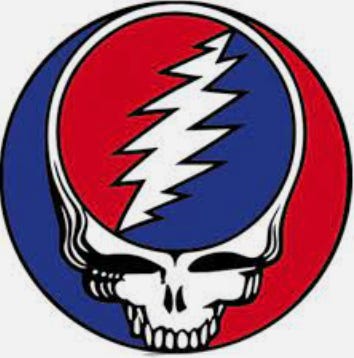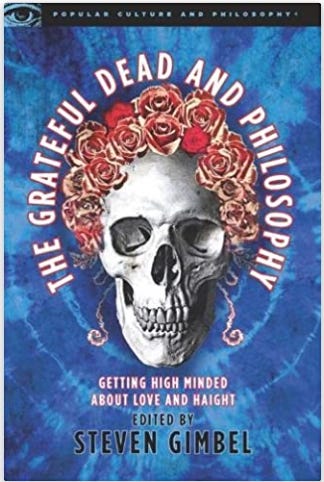Welcome aboard The Bus!
ORIGINALLY PUBLISHED (1.49) 22 SEPTEMBER 2022
The Stop
The Grateful Dead was an American rock band with a uniquely eclectic style. Fusing rock, country, jazz, bluegrass, blues, gospel, reggae, world music and psychedelia, the band was known for its extended live performances, instrumental jams and its devoted fan base, known as Deadheads. Formed in Menlo Park, California in 1965, the band was a central part of the 1960s counterculture in the San Francisco Bay Area and its founding members - Jerry Garcia (lead guitar, vocals), Bob Weir (rhythm guitar, vocals), Phil Lesh (bass, vocals) and Bill Kreutzmann (drums) played together for the duration of the band’s 30 year history. Drummer Mickey Hart joined in 1967 and, with the exception of a leave of absence from 1971 to 1974, also remained with the band until the end. His second drum and percussion kit added ‘new rhythmic intensity’ and his professional ‘commitment to practice’ enabled the band to ‘realise their psychedelic musical vision.’1
Originally called the Warlocks, when the band discovered this name had already been taken they decided to pick another one out of a dictionary at random. The ‘Grateful Dead’ - a ‘folktale in which the protagonist resolves the debt of a deceased stranger, and later receives karmic repayment from their incarnate spirit’ - worked perfectly and the band debuted their new name at Ken Keysey and the Merry Pranksters’ inaugural public Acid Test in December 1965. Their involvement at this and subsequent Acid Tests ‘cemented the band’s part in the multidisciplinary Bay Area arts scene’ flourishing around the use of ‘still-legal LSD’ - a relationship that continued long after the chemical became illegal.
Founding keyboardist Ron ‘Pigpen’ McKernan died of alcoholism in 1973 and was replaced by Keith Godchaux on acoustic piano. Several months later, Keith’s wife - Donna Jean Godchaux - a former Muscle Shoals session singer who had sung on hits by Elvis Presley and others - joined, bringing a new dimension to the previously male-only band. The Godchauxs remained with the band until 1978, when Keith was replaced by Brent Mydland who ‘shifted the onstage energy, introduced new tonal colours and filled out what became the band’s longest-running lineup.’ Mydland died of an overdose in 1990 and was replaced by a double-keyboard lineup, featuring Vince Welnick and Bruce Hornsby when on tour. Following Hornsby’s departure in 1992, the band’s popularity grew to ‘beyond manageable proportions’ which in 1995 resulted in a ‘troubled summer tour’ that culminated with the death of Jerry Garcia that August - and the official dissolution of the band four months later.
The Dead have an extensive back catalogue, beginning with their self-titled debut album in 1966, but their live shows are most interesting.2 Over the years, the band would ‘blossom both onstage and in the studio,’ building their live shows into ‘jam-linked suites’ and allowing audience members to record the shows. This openness to recording enabled the band to be documented to a degree unlike any other - and Deadheads who collected tapes were known for keeping close records of the various live versions of the songs. In April 2008, Bob Weir and Mickey Hart announced that the University of California - Santa Cruz would be the permanent home of the Grateful Dead Archive, consisting of the complete archival history of the band from 1965 to the present day.
The Detour
Today’s Detour is to an article from The Washington Post which asks - can the events portrayed in the classic film Ferris Buehler’s Day Off actually be accomplished? Which, evidently, they can …. It’s a limited/gated link, so I hope you can see it:
Could 'Ferris Bueller's Day Off' really be done?
The Recommendation
Building off of today’s Stop, today’s Recommendation is The Grateful Dead and Philosophy: Getting High Minded About Love and Haight (Ed. Gimbel, Steven) Chicago: Open Court, 2007. Bad puns aside (and, unfortunately - or not, depending on your mindset - the puns continue throughout the book), it’s an interesting collection of quite serious articles ranging from Johannes Bulhof’s ‘Me and My Uncle ... and Thomas Hobbes: On the Ethics of Leaving His Dead Ass There by the Side of the Road’ to Matthew Turner’s ‘I’m Just Playing in the Band: Stoicism, Taoism and Freedom.’ It’s serious philosophy, but with a lovely turn. Give it a try - you’ll definitely see things differently.
From the back: Once in a while, you get shown the light, in the strangest of places, if you look at it right. Here, twenty-one philosophers and devoted Deadheads ponder some of the implications of the Dead Experience, for art, ethics, conflict, community, and cosmos. Many philosophical traditions, Eastern and Western, help to illuminate the achievements and the importance of the Grateful Dead.
The Sounds
Today’s playlist is composed of several live Grateful Dead tracks. It’s difficult to distil the band into a short list, so I decided to select ones that paint a broad picture: ‘Loser’ (1977), ‘Althea’ (1980), ‘Lazy Lightning/Supplication’ (1977), ‘Peggy-O’ (1977) and ‘Morning Dew’ (1972). Enjoy!
The Thought
Today’s Thought is from the Jewish theologian and philosopher Abraham Joshua Heschel (1907-1972):3
‘When I was young, I used to admire intelligent people; as I grow older, I admire kind people.’
If you have a thought on this Thought - or any part of today’s issue - please leave a comment below:
And that’s the end of this stop - I hope you enjoyed a brief diversion from your regular journey!
Thanks to everyone who subscribes - I genuinely appreciate your interest and support. If you like The Bus, please SHARE it with a friend or several hundred.
If you haven’t climbed aboard, please do!
Until the next stop …
The Grateful Dead is too complicated to be fully explored within the limitations of the Stop. If you’d like to learn more, see: www.dead.net. There are also two good documentaries about the band, both of which are currently streaming: The Other One (about Bob Weir - and the source of today’s subtitle) which is on Netflix and the 6-episode Long Strange Trip on Amazon Prime Video. Sources for today’s Stop include these documentaries, along with https://www.dead.net/biography and Jarnow, Jesse. Heads: A Biography of Psychedelic America. Boston: Da Capo Press, 2016.
Over the years, the band played more than 2,300 concerts - of which nearly 2,200 were recorded.







Great read! Thanks for sharing Bryan
I never got into the Dead. I think I associated it with my parents’ generation. You don’t say whether you like them or not Bryan. Listening to your playlist now with my morning reading.